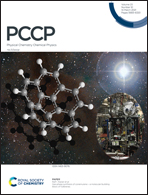On the liquid demixing of water + elastin-like polypeptide mixtures: bimodal re-entrant phase behaviour†‡
Abstract
Water + elastin-like polypeptides (ELPs) exhibit a transition temperature below which the chains transform from collapsed to expanded states, reminiscent of the cold denaturation of proteins. This conformational change coincides with liquid–liquid phase separation. A statistical-thermodynamics theory is used to model the fluid-phase behavior of ELPs in aqueous solution and to extrapolate the behavior at ambient conditions over a range of pressures. At low pressures, closed-loop liquid–liquid equilibrium phase behavior is found, which is consistent with that of other hydrogen-bonding solvent + polymer mixtures. At pressures evocative of deep-sea conditions, liquid–liquid immiscibility bounded by two lower critical solution temperatures (LCSTs) is predicted. As pressure is increased further, the system exhibits two separate regions of closed-loop of liquid–liquid equilibrium (LLE). The observation of bimodal LCSTs and two re-entrant LLE regions herald a new type of binary global phase diagram: Type XII. At high-ELP concentrations the predicted phase diagram resembles a protein pressure denaturation diagram; possible “molten-globule”-like states are observed at low concentration.



 Please wait while we load your content...
Please wait while we load your content...